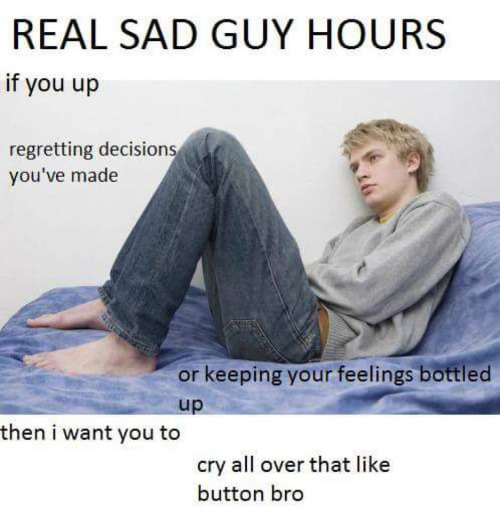Sordidsass-blog - Sordid Sass


More Posts from Sordidsass-blog and Others

Why are Med students so depressed?
I’ve noticed many of the smartest people I know, mostly premeds and medical students, struggle with depression and have for years. I wouldn’t have guessed if they hadn’t mentioned it. It seems odd to me that they do well academically and seem to have everything under control, but they themselves don’t believe they do. Also, to me, depressed premeds and med students seem like the norm now since I’ve met so many of them…have you noticed something similar? And what do you think may be the cause? -mademoisellepremed

It will always be special, Pendleton Ward. Here’s to 2 more years of new Finn & Jake… and the Adventure that will live forever.


my utopia
The PTSD is strong in this one.
The Psychosis Checklist
What is psychosis? Are you experiencing it? Psychosis can manifest in different ways, and this checklist can help you figure out if what you’re experiencing is indeed psychosis. One may use it to self-diagnose or as a worksheet to present to a doctor or therapist or other medical professional and better communicate symptoms they are experiencing. All information is taken from the DSM-5.
In order to for your experience to be considered psychosis, you must experience ONE or more of the following:
Delusions
Hallucinations
Disorganized Thinking
__ / 3
Delusions Must check ONE or more of the following:
I experienced fixed beliefs which won’t change even when I am faced with contradicting evidence.
I am convinced an individual or group is going to harm me, even though I have no evidence they want to do so, and no reason to believe they do. (Exception: Many people who feel someone intends to harm them do have reason for doing so, but are gaslighted into believing they are instead delusional.)
I will believe certain gestures, comments, or environmental cues are directed at me, even once it’s proven to me they are not.
I believe I have exceptional abilities, wealth, or fame.
I believe someone is in love with me, even when they have told me they are not.
I believe a major catastrophe is going to occur, despite having no evidence or being presented with evidence disproving my belief.
I am preoccupied with the thought something is wrong with my body or organs, despite having no symptoms or having proof nothing is wrong with me.
I feel as if my thoughts are not my own, or that I am being controlled.
__ / 8
Symptoms MUST cause distress in social, occupational, or interpersonal functioning.
Hallucinations Must check ONE or more of the following:
I experience incredibly vivid experiences without an external stimulus.
I hear voices, whether familiar or unfamiliar, which are separate from my own thoughts.
I see things which are not really there, very clearly as if they are physically there.
__ / 3
Symptoms MUST only be present while the person is fully awake, and not right before going to bed or when just waking up. Hallucinating before and after sleep is quite normal.
Disorganized Thinking Must check ONE or more of the following:
I switch from one topic to another very quickly, and the topics are not related to each other at all.
My answers to questions are hardly related to the questions asked, or not related at all.
My speech is disorganized and it’s hard to understand me. (must be severe enough to impair communication, as disorganized speech is common in non-psychotic disorders)
__ / 3

If you like more of this, follow @psych2go.

If you like more of this, follow @psych2go.
Anxiety attacks aren’t always hyperventilating and rocking back and forth
Anxiety attacks can take different forms, such as:
Unpredictable bouts of rage or irritability
Nit-pickiness (obsessive behavior, which may be a part of OCD), and even a hypersensitivity to disarray, chaos, or any sort of change
Fast-talking, stuttering, stumbling over words
Not talking at all
Sitting rigid, staring into space, almost seeming “zoned out”
Understanding the way our or other’s anxiety works can help to decrease the stigma and help to calm a person faster and get them out of that state. These are just a few, but it gives an idea of the range in which attacks can come.
Fucking PSA
Unfriendly reminder that having an anxiety disorder isn’t cute or quirky
Unfriendly reminder that chronic and severe depressive disorders aren’t something to be glorified or glamorized
Unfriendly reminder that eating disorders are legitimate problems for millions of people and have taken so many lives, and it’s not some cute fucking fad
Unfriendly reminder that it isn’t okay to romanticize depression, anxiety and eating disorders but still continue to stigmatize and stereotype Schizophrenia, Bipolar, Borderline Personality Disorder, etc
Unfriendly fucking reminder that mental illnesses aren’t for your aesthetics or to be thought of as some cutesy quirk or quality, they’re legitimate problems that people struggle with every single day and are to be taken much more seriously than they are
-
 diannicornthings liked this · 4 years ago
diannicornthings liked this · 4 years ago -
 xgirlcxndrexm liked this · 4 years ago
xgirlcxndrexm liked this · 4 years ago -
 touching-spirit-bear liked this · 4 years ago
touching-spirit-bear liked this · 4 years ago -
 major-mitty liked this · 4 years ago
major-mitty liked this · 4 years ago -
 whatever-the-hell-i-want reblogged this · 4 years ago
whatever-the-hell-i-want reblogged this · 4 years ago -
 caitiejune reblogged this · 4 years ago
caitiejune reblogged this · 4 years ago -
 we-the-dreamers liked this · 5 years ago
we-the-dreamers liked this · 5 years ago -
 chrishansenfromdatelinenbc liked this · 5 years ago
chrishansenfromdatelinenbc liked this · 5 years ago -
 huidanspikejaeger reblogged this · 5 years ago
huidanspikejaeger reblogged this · 5 years ago -
 mysteriouslygenerouswerewolf liked this · 5 years ago
mysteriouslygenerouswerewolf liked this · 5 years ago -
 yourfamilyfriendsatan liked this · 5 years ago
yourfamilyfriendsatan liked this · 5 years ago -
 isas-identity reblogged this · 5 years ago
isas-identity reblogged this · 5 years ago -
 isas-identity liked this · 5 years ago
isas-identity liked this · 5 years ago -
 slapsticktoon liked this · 6 years ago
slapsticktoon liked this · 6 years ago -
 sophiesksksk reblogged this · 6 years ago
sophiesksksk reblogged this · 6 years ago -
 zerodefinatelynotthehero liked this · 6 years ago
zerodefinatelynotthehero liked this · 6 years ago -
 hcng reblogged this · 6 years ago
hcng reblogged this · 6 years ago -
 laylachaan liked this · 6 years ago
laylachaan liked this · 6 years ago -
 cantcomeupwithsomethingcreative reblogged this · 6 years ago
cantcomeupwithsomethingcreative reblogged this · 6 years ago -
 cantcomeupwithsomethingcreative liked this · 6 years ago
cantcomeupwithsomethingcreative liked this · 6 years ago -
 niteskies reblogged this · 6 years ago
niteskies reblogged this · 6 years ago -
 m0496 liked this · 6 years ago
m0496 liked this · 6 years ago -
 thewolfofthestars liked this · 6 years ago
thewolfofthestars liked this · 6 years ago -
 camelotsakini liked this · 6 years ago
camelotsakini liked this · 6 years ago -
 alexanderlightwoodii reblogged this · 6 years ago
alexanderlightwoodii reblogged this · 6 years ago -
 vixenofcourse liked this · 6 years ago
vixenofcourse liked this · 6 years ago -
 sinfulmusingsblog-blog liked this · 6 years ago
sinfulmusingsblog-blog liked this · 6 years ago -
 diary-of-an-onliner liked this · 6 years ago
diary-of-an-onliner liked this · 6 years ago -
 crazy56u reblogged this · 6 years ago
crazy56u reblogged this · 6 years ago -
 crazy56u liked this · 6 years ago
crazy56u liked this · 6 years ago -
 pakai liked this · 6 years ago
pakai liked this · 6 years ago -
 kimcheehan reblogged this · 6 years ago
kimcheehan reblogged this · 6 years ago -
 large-matcha-green-tea liked this · 6 years ago
large-matcha-green-tea liked this · 6 years ago -
 lots-wife reblogged this · 6 years ago
lots-wife reblogged this · 6 years ago -
 babesbooksandbattles liked this · 6 years ago
babesbooksandbattles liked this · 6 years ago -
 desveladamuycansada liked this · 6 years ago
desveladamuycansada liked this · 6 years ago -
 glloriouspond reblogged this · 6 years ago
glloriouspond reblogged this · 6 years ago -
 bleofjsksidn liked this · 6 years ago
bleofjsksidn liked this · 6 years ago -
 sanabakkoushisanangel reblogged this · 6 years ago
sanabakkoushisanangel reblogged this · 6 years ago -
 nanaisbabe liked this · 6 years ago
nanaisbabe liked this · 6 years ago -
 cocobunny0203 liked this · 6 years ago
cocobunny0203 liked this · 6 years ago -
 boazpriestly reblogged this · 6 years ago
boazpriestly reblogged this · 6 years ago -
 gracecale liked this · 6 years ago
gracecale liked this · 6 years ago -
 erandri reblogged this · 6 years ago
erandri reblogged this · 6 years ago -
 bimillenial liked this · 6 years ago
bimillenial liked this · 6 years ago -
 cultofthorns liked this · 6 years ago
cultofthorns liked this · 6 years ago
Struggling with mental illness after a traumatic event most likely caused by mental illness. Sexual Assault Survivor.
282 posts